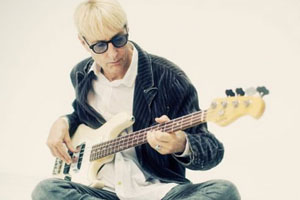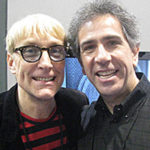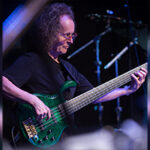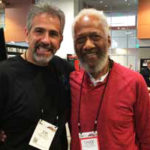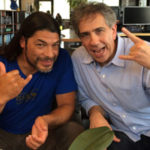Late night icon tells all about his southern uprbringing, migration to New York City and classic stories about the Letterman show!
Exclusive interview with FBPO’s Jon Liebman
May 31, 2010
Will Lee was born into a musical family in San Antonio, Texas. Ever since the age of three, when he heard Miles Davis’ trumpet drifting into his bedroom from his parents’ stereo, music was in Will’s blood. Throughout his childhood, Will’s parents had him studying one instrument after another, from piano to violin, trumpet and French horn.
After seeing the Beatles on the Ed Sullivan show, Will took up the drums and began playing in local bands in Miami, where the Lees now lived. Having decided that drummers in Miami were “a dime a dozen,” Will shifted to bass and soon became an in-demand player for several top 40 bands. Eventually, he became a bass major at the University of Miami School of Music, where his father was the dean.
Determined to pursue a career as a professional musician, Will relocated to New York City, where his career took off. The young Lee toured with Dreams, B.J. Thomas, Horace Silver, Bette Midler, Barry Manilow, the Brecker Brothers and Herbie Mann. Equally talented as both a bassist and vocalist, Will has sung and played bass on over 1,000 pop, jazz and rock albums, including those by Ricky Martin, Burt Bacharach, the Bee Gees, George Benson, James Brown, Aretha Franklin, Ray Charles, Luther Vandross, Mick Jagger, Cyndi Lauper, the Miami Sound Machine, Buddy Rich, Liza Minnelli, Diana Ross, Grover Washington Jr., Cat Stevens, Vanessa Williams, Billy Joel, Barbara Streisand, Carly Simon, Frank Sinatra, Mariah Carey, Pat Metheny, Steely Dan and countless others. He has also played bass and sung on a great many radio and television commercials.
Will can be seen and heard every weeknight as the bass player and a vocalist in the CBS Orchestra for “The Late Show With David Letterman.” He is also the founder of The Fab Faux, a Beatles tribute band.
FBPO: I guess music is just naturally in your blood, given your parents’ backgrounds. Do you think you were just destined to become a musician, one way or the other.
WL: Well, I guess for a lot of people, there was a fork in the road, or many forks in the road. For me, there was never a fork. I just kept doing what I was doing. I was playing from really early on. As soon as the Beatles showed up on the Ed Sullivan Show, I knew what I wanted to do. I remember walking to class the next day, asking schoolmates, “Wanna do a band? Do you play anything?” And the next thing I know, we got a gig that paid six bucks and it was really exciting!
FBPO: Well, you’ve got to start somewhere, right?
WL: Yeah. And after that, you know, I guess the first thing that comes to mind at the end of the gig is, “When’s the next gig?”
FBPO: You played a lot of instruments before finally getting around to the bass, didn’t you?
WL: I guess so. I did a lot of instrument playing out of parental guidance until following my own instincts and going to bass.
FBPO: According to your website, you played violin and French horn. I also remember seeing something about “tortuous piano lessons.”
WL: Yeah! They don’t need to be tortuous, but if the teacher is making them that way, then it can just change your whole outlook on any particular subject for the rest of your life. In this case, I had a teacher who was really kind of difficult and strict and no fun, really.
FBPO: So, how did you end up as a bass player?
WL: It was kind of by accident, actually. It was a matter of necessity. We already had a band going and I was the drummer in the band. Cats that were 11 or 12 years old didn’t really have a concept of what bass was supposed to do. So our band consisted of two guitar players, a saxophone player and me on drums and vocals. Pretty soon I started to feel the need to fill out the sound and get a little bit more professional-sounding rhythm section thing going on with that band. Our little silly band started out playing a lot of surf instrumentals because there was no PA system. We started saving up until that really exciting day came when we got a PA. It was a changing moment! All of the sudden, we were in another league, so it was really, really cool.
FBPO: Were you still in Texas at the time, or had you already moved to Miami?
WL: By then I was in Miami already.
FBPO: What took you to Miami from Texas?
WL: My dad is a music educator and has written many books and stuff like that. He also plays bebop piano. He was the chairman of the Sam Houston State College Music Department in Huntsville, Texas, when I was 11. We were there from the time I was age 3 till age 11. After that, he got tapped by the University of Miami to be the dean of that college and he held that position for twenty-something years.
FBPO: You went to the University of Miami, didn’t you?
WL: I did. I had my choice of any school in the country and, for some reason – I guess I liked my bedroom, which was about two blocks away from school – I decided to go to that school.
FBPO: Weren’t you a French horn major first?
WL: I was. It was ridiculous because I was so awful, but yes, it’s true.
FBPO: But then you switched over to bass major.
WL: Yeah. I have company in that area, too. Mark Egan was a trumpet major at the same time.
FBPO: You guys were there together?
WL: Yeah! In fact, we’re still close and it’s been a really long time of bass brotherhood. He started playing bass after I left. I think I might have left a little bit of a hole in the jazz band at school and they needed somebody. I think that might have been when he switched over.
FBPO: Were you playing upright at all, too?
WL: No, just electric.
FBPO: That was one of the cool things I remember about the University of Miami. If you declared an instrument as part of your major, it didn’t necessarily have to be from the traditional, classical group of instruments.
WL: That’s true. It wasn’t always that way, though. My dad kind of brought that dynamic in. In fact, he called me one day after I’d already started digging some deep roots in New York City and said they were going to have an electric bass department and asked if I wanted to head it up. I said, well, thanks, Dad, but I’m doing pretty well in New York, but thank you anyway.
FBPO: Was that when Jaco came in?
WL: That’s when Jaco was the next call.
FBPO: I bet we can really go off on a tangent here…
WL: Some great stories came with that whole scene.
FBPO: Can you share one?
WL: The one that’s most startling to me is that there were three people I’m aware of who became New York musicians who got to sit in the room with Jaco as their bass teacher: Hiram Bullock, Mark Egan and Frank Gravis. Frank Gravis was a guy I first heard in Miami. When I went back down there, I saw him playing with Phyllis Hyman, I believe. It turns out that Frank Gravis and I – this is a side story to the side story to the side story – Frank Gravis and I were born in the same hospital in San Antonio, Texas, twelve days apart and both ended up New York bass players. Oliver North, the Iran-Contra guy, was also born in that hospital, but at a different time.
Anyway, the story that was consistent that I’ve heard from all three of those guys was that they would show up for the lesson and Jaco would say, “Hey, man, play this groove.” He would give them a line to play and they would play it for an hour while he soloed. Then it was, “See ya next week!”
FBPO: What took you to New York from Miami?
WL: It was very strange. There was a band called Dreams, that all my peers and I were really focused on. Billy Cobham was the drummer, Mike and Randy Brecker and Barry Rogers were the horn section. We would listen to their record every day. We’d find an excuse to get together and listen to Dreams. As far as we were concerned, because of the world I was living in at the time, which was a world of playing rock music at night, six sets a night, six nights a week, and studying jazz in the daytime, this band Dreams was the ideal fusion of those two worlds.
In our minds, Dreams were the next Beatles. Out of the blue, I got a phone call one day from Randy Brecker. It turns out that a guy was down there guest lecturing one day for an arranging class or something, a guy named Gary Campbell. And we had a jam the night of his guest lecture. As it turned out, he went back to New York and told the Dreams guys about this kid in Miami that he had jammed with. It just so happened that Chuck Rainey was leaving the band at the time. Thank God for ignorance, because I had no idea who Chuck Rainey was!
FBPO: How old were you at the time?
WL: I was 18.
FBPO: So you couldn’t have been at the university very long.
WL: I started college at 16 because I used to be smart, I guess! My discovery of Chuck Rainey was after I had turned my back on Miami and moved into Mike Brecker’s pad in New York before I could afford my own place. One day, I was in the kitchen while he was practicing in the next room. I was listening to a local soul station on the radio and they were playing Roberta Flack’s version of the song, “Reverend Lee.” The bass part on this record was coming out of the speaker and notes I’d never heard before played on a bass before were being played by the bass player. I said, “Mike, come in here! You gotta check this out. Listen to this unbelievable bass playing!” Mike said, “Yeah, that’s Chuck.” I almost died! Had I known that I was coming to New York to replace this guy, I never would have gotten on that plane.
FBPO: How long did it take you to get established in New York once you got there?
WL: It was a slow trickle because I had pretty much stayed in the world of Dreams, touring around without ever really crossing over to that other studio world for the first year or two. I became aware of it immediately and it looked like the dream gig of a lifetime to be able to walk into a different room every couple hours with a different band, playing a new piece of music that you probably never have to play again and do that like five to eight times a day. I never even fantasized about being a part of that. I just saw it as this majorly sewn up kind of scene that looked like it was out of my league completely. So I never really had any designs on doing that.
One day, after Billy Cobham left the band, we were rehearsing with Steve Gadd, trying to see if there was a way we could salvage the band and keep it together. Unfortunately, it never happened. At that rehearsal, Gadd said that Tony Levin couldn’t make a session the next day and asked if he could recommend me to do it. It was a jingle for Contact cold pills. And I said, “Hell yeah, man, that sounds fantastic!”
I showed up at the session and they thought I was this really hip guy on the scene because I was coming from Dreams. These guys had the whole Contact cold pill commercial campaign for that year and they were doing all these different versions – country versions and rock versions and R&B versions, radio and TV spots. And they said, “Hey, man, you’re on the scene. Do you know anybody who can sing like a white, blue-eyed soul version of this song?” And I said like this? And I gave them my rendition of what I thought they were looking for. They said to come in tomorrow and sing this commercial. It was the final version going right on the air! That was my introduction into the singing world of studio music in New York. That moment. And they would hire me again and again after that.
The other thing that got me into the scene was when Bob Mann, the guitar player from Dreams, was arranging jingles for another company and he had me come in and sing and play on a Kentucky Fried Chicken commercial one day. The producer of that spot, and that whole campaign, was also somebody who was doing major stuff. So then I was into that other jingle house’s stuff, too. There were a lot of people who did mostly jingles, but luckily I was a guy who did as many records as jingles. It was kind of wonderful.
FBPO: What advice do you have for young, eager, talented musicians today who want to take off for the big city and make it as a musician, keeping in mind we’re talking about today, rather than twenty or thirty years ago?
WL: The only thing I would ever say to anybody who wants to be a musician is don’t do it for the money, whatever you do, because that could lead to lots of heartbreaks. I only say that because there are no guarantees, ever, about doing that and making money doing that. The best thing to do would be to try to set yourself up in a situation where you don’t need it to survive financially.
FBPO: What about the scene in general? What can somebody expect today?
WL: Well the scene is constantly changing, so the scene is never going to be like what it was. There are only little hints of that kind of dynamic that still exist. I think the only reason I still get called is because I’m so established, so when people think of bass, they think of me. It’s word of mouth. It’s exposure. I guess it’s also how people get used to seeing you play. One of the things I think it would be great to do would be, instead of waiting for the phone to ring, to start something. Start your own band. Start your own jam scene or something and create a network. Then after a while, people will get used to thinking of you as the guy who plays keyboard or you as the guy who plays bass or you as the guy who does your thing.
FBPO: How did you get the Letterman gig?
WL: Well, being in New York was a big part of it. The biggest part was just being here, because that allowed me to have been on sessions with Paul Shaffer. Paul had produced an album of a band that I had, called the 24th Street Band, with Hiram Bullock, Steve Jordan and Clifford Carter. We had been on some albums together – Barry Manilow and Cher and things like that. He first hired me because he was aware of who I was when he came down here from Canada because he’d read my name on album credits. We were actually hanging one day right after the 24th Street Band had broken up, which was amazingly convenient for him because he took that band, minus the keyboard player, and turned it into the first Letterman Show band: Steve Jordan, Hiram Bullock and me.
FBPO: I remember it well.
WL: Yeah! So we were kind of a ready-made band. And he said, “I got this call be the musical director of this comedy talk show thing with music and I have this idea to do instrumental James Brown, Motown and Beatles music and stuff like that. Would you like to do it?” And I said “When is it and how long is it for?” He said it’s a thirteen-week pilot. The first thing I thought was, “Wow! Thirteen weeks of solid work!” I had never had that before. This was exciting. And I said when does it start? And he said, “The show starts next week.” So I said, “Oh. Why don’t we go learn some songs, like now!” So we started putting together instrumental versions of songs like “Tears of A Clown,” “Goin’ To A Go-Go” and all kinds of cool stuff. That was February 1982 and we’re still going strong.
FBPO: You’ve had that gig a long time. What stands out as something unusual or memorable that happened on that show?
WL: The greatest surprise was probably when James Brown was on the show in the first year. At that time, a musical guest was lucky to have one song on the show. I think two had never happened before, but James Brown was already slated to do two songs. And the band had brought its “A” game for him and he brought the best out in the band, too. At the commercial breaks, we’d play instrumental versions of his stuff. He was sitting at the desk with Dave going into the last commercial and he heard us playing “I Got The Feeling.” And he was so moved by the way the band was playing it. Going into the last segment of the show, Dave said, “Is there anything you want to do before we close?” And he said, “Yeah, Dave. Before we close, can we close with ‘I Got The Feeling?’” [Editor’s note: Will does a mean James Brown impersonation!] This was a third song, which has never happened on the show since. No one has ever done three songs in one hour-long show. The audience went berserk and we went nuts and we played the song and it was just heaven because it was unrehearsed and it was just amazing!
FBPO: You’ve performed with so many musicians over the years. On your website, you have a clip of yourself performing with Sammy Davis, Jr., with the Letterman band. Why did you single him out over so many other stars?
WL: Because there’s not a day that goes by when I don’t think about Sammy Davis, Jr. There’s something about his persona and his whole attitude that makes me laugh and makes me feel good. He never has a bad thing to say about anybody. Dave was interviewing him at the desk, trying to bring out any kind of dirt he could on Sammy. And Sammy, instead of getting riled up, at one point just said, “You are a delight!” That’s a typical attitude for him to have.
The first time he was on the show, it was that first band, with Jordan and Hiram, and we were bringing it. We were pulling out our best songs and at one point, Sammy was looking longingly at the band and Dave asked him the obvious question, “Well, what do you think about our band?” And Sammy goes, “I can’t get over that, man!” [Will does a pretty darn good Sammy impression too!] It just got us!
FBPO: Tell me about the Fab Faux.
WL: The Fab Faux is a working band and we’re coming up to the beginning of our thirteenth year. It’s a band we formed to bring Beatles music to the stage. That’s how I look at it. I’ve always been inspired by the Beatles since that first moment on the Ed Sullivan Show. They were the spark that started my whole career. Throughout my career, everything I do, I refer to the Beatles. Whenever I play any kind of music, there’s always that underlying inspiration and “What would the Beatles do?” kind of thing going through my mind and in my blood.
I met this drummer, Rich Pagano, on a a Hiram Bullock mini-tour of Europe and we started hitting it off right away, talking about Beatles the whole time. I noticed in his playing that he sounded so much like Ringo and that his vocal style was so much like John Lennon. After the tour was over, I came back to New York and I was standing next to a guy who books the music at the China Club. We were watching a band and it dawned on me at that moment. I said, “If I start a Beatle band, would you hire us to play here?” And he said, “Sure!” So I called Rich Pagano the next day and I had already figured out that I wanted to have more than four people in the band because it takes more than that to create these records – percussion parts doubled, vocals, extra keyboard parts, cool textures and stuff – way more interesting than just having people dress up and pretend to be the Beatles and having the music itself taking a back seat to that. So I thought it would be a great idea and a lot of fun to just try doing it once. And it was so much fun that we kept going and now it’s like year thirteen. And it’s still a challenge because we always break it up and play different sets every time we play, so we get our ass kicked by this great music!
FBPO: Congratulations on keeping it going so long.
WL: I’m kind of proud of us because, in New York, it’s really hard to have five guys agree on something for that long!
FBPO: What else would you like to do musically that you haven’t already done?
WL: I just want to finish songs that I’ve started. I want to keep writing and get better at writing. I want to allow myself to finish the songs that I’ve started because I have a lot of great stuff in the works. I’ve got a couple albums coming out with some original material. One is the John Blackwell album, Prince’s drummer, and that album is just now being released and I’ve got a couple of songs on that. One of them has a vocal by Esperanza Spalding, who does a beautiful job.
FBPO: Does she play bass on it too?
WL: No, she just sings. We did the tracks out in L.A. And this band that I have called Toph-E & the Pussycats. We’re actually mastering our album now. I’ve got three or four songs on that record. So, you know, it’s happening.
FBPO: What do you like to do that’s not necessarily musically oriented?
WL: I love to scuba dive. And I love to spend any amount of time I can with my wife, Sandrine, because she’s always inspiring.
